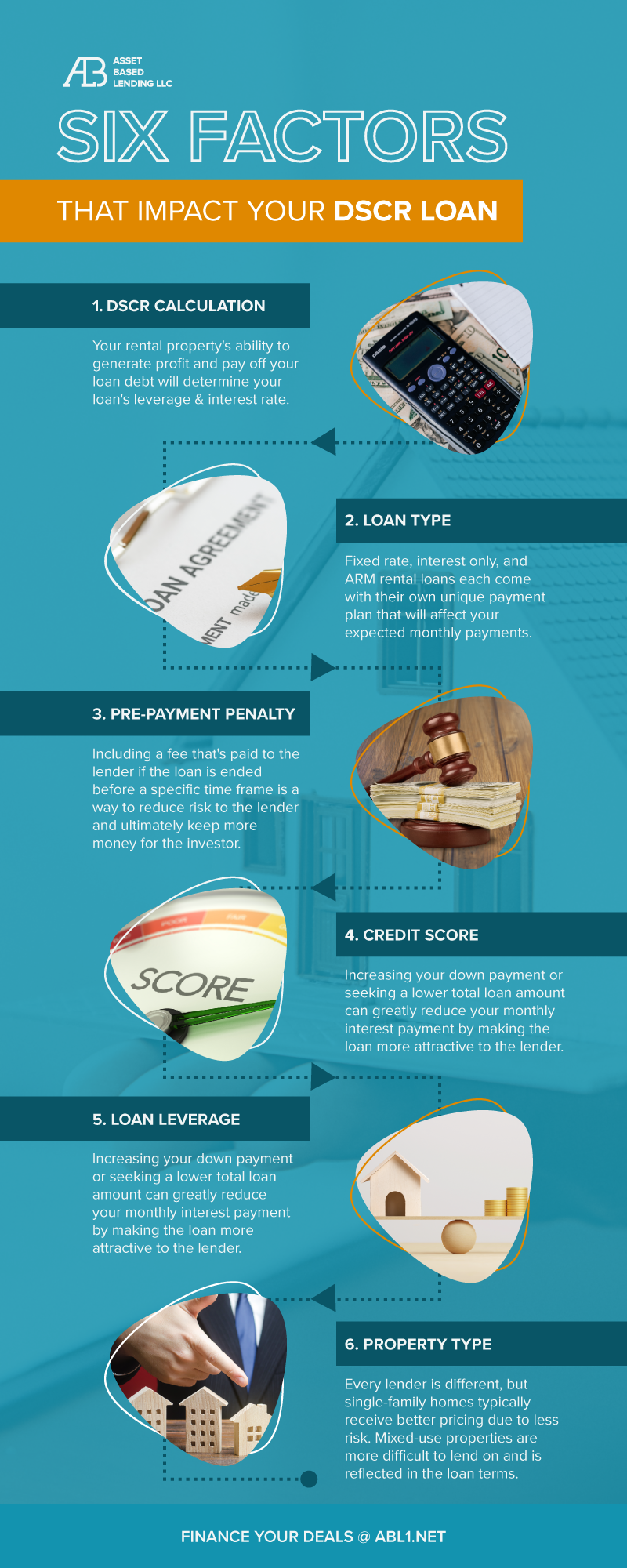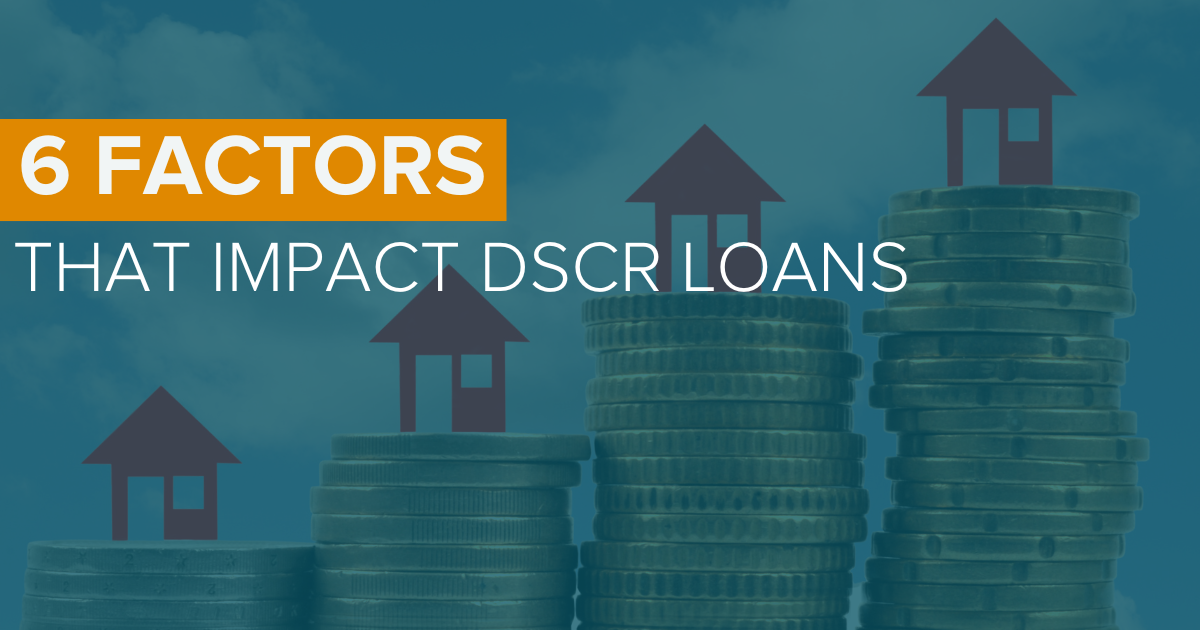The Six Factors That Impact Your DSCR Rental Loan
As a direct DSCR lender for real estate investors, we’re often asked questions about our lending process and how rental loan terms are ultimately decided. There are several major factors that impact terms for rental loans, and investors can use this knowledge to their advantage by understanding how hard money lenders like ABL calculate their loans and what they can do to receive the best possible terms. Below are the six factors that influence your DSCR rental loan!


DSCR Calculation
Your typical loan for rental property is based on DSCR, or the debt service coverage ratio. It’s basically a question of how much of the loan’s debt will your monthly rent cover. DSCR is determined by a simple math equation: its your net operating income divided by your debt obligations. In the case of rental property, it would be your expected monthly rent divided by the monthly payment you would owe on your rental loan.
If your monthly loan payment is $1,000 and your monthly incoming rent is $1,500, then your DSCR is a 1.5. This is an excellent ratio! Typically, lenders look for a debt service coverage ratio of at least 1.1 and start to offer better terms at 1.2 and higher. The higher the DSCR, the less risky your loan, since you’ll prove to the lender that your property receives the necessary income to cover your debt while still making a profit. Lenders are constantly assessing risk, so lower risk loans will always receive better pricing. Once your loan is paid off, your asset will be generating payment-free profits for as long as you continue to hold it in your portfolio.
Ensuring that your investment property has a reliable, positive cash flow is not only important for your business strategy, but it’s important for securing the most desirable rates & leverage for your DSCR loan. If you’re looking to crunch numbers ahead of time, then use our DSCR loan calculator to figure out what terms you can expect on your upcoming investment property!

Loan Type
Loan terms are also decided based on the type of rental loan you choose to obtain, which are differentiated by the payment plan. For example, Asset Based Lending offers loans for rental property with fixed rate, interest only, and ARM options. Each type of loan focuses solely on the cash flow of the property and can be closed in less than 30 days, which is huge for real estate investors looking to move quickly on an opportunity. There’s pros and cons to each DSCR loan for investment property, but for now we’ll focus on how each of them impacts the potential loan terms.
The 30-year fixed rate rental loan is paid back exactly how it sounds: on a fixed, predetermined rate that spans the life of the loan. Borrowers have the option of refinancing their loan down the road, but otherwise these are set terms that will not be affected by future market changes. The interest rate attached to this type of loan is determined by the market rate at the time of the loan, which is why you see interest rates rise & fall across the industry and not just by one or two companies. Additionally, borrowers can receive the best possible leverage and interest rate if a prepay penalty is attached to the fixed rate DSCR loan; more on that later.
The interest only rental loan allows borrowers a specific period of the loan’s life, typically between 5 and 10 years, where they only have to pay the loan’s interest. Once that period is over, the borrower will return to paying the monthly principal on top of the loan’s interest. This type of loan comes with lower up-front monthly payments It also becomes easier to qualify your DSCR loan since the initial monthly payments will be lower, which means the property does not need as much incoming cash to cover the monthly debt payment. The tradeoff for this interest only loan is stricter constraints on the leverage and loan size, along with higher interest rates than the fixed rate loan.
ARM DSCR loans, also known as adjustable-rate-mortgage, typically starts at a lower interest rate than both the fixed-rate mortgage and interest only loan. ARM loans have a fixed period where the rate is unadjusted, and once that period expires, they are adjusted once per year for the remainder of the loan. For example, if the loan was an 5/1 ARM, then you would have a 5-year period of fixed rate and a remaining 25 years where your interest rate & monthly payment can adjust once per year. With rates expected to drop in the coming years, real estate investors may prefer an ARM rental loan, but they’re subject to market conditions that could ultimately prove unfavorable.
The best DSCR lender knows how important it is to offer a variety of rental loan options to meet the different needs among real estate investors. Each investment strategy is different, even project to project, and borrowers need to have flexible financing options to maximize their portfolio.

Pre-Payment Penalty
The term pre-payment penalty can scare a lot of real estate investors, but it’s a tool that can be used to save investors’ money and maximize their returns. Hard money lenders, and really any type of real estate lenders, prefer stability in their loans. The less risk associated with the deal, the better. Pre-payment penalties allow for a level of guarantee to the lender by ensuring that a loan will exist for a specific time frame, guaranteeing an expected level of income. Or, if the loan is exited early, the penalty paid by the borrower ensures the lender earns a minimum revenue worth their time and risk.
In either event, a prepay penalty offers reduced risk for the lender. Since this lowered risk allows for better loan pricing, investors who know what their exit strategy looks like can receive a rental loan that includes a prepay penalty in exchange for either a lower interest rate or higher leverage. If an investor plans to hold the property long-term, then including a prepay penalty in their DSCR loan is simply a way to lower their interest rate at no change to their investment strategy!

Credit Score
One of the few strict requirements that hard money lenders utilize when determining their ability to lend to a potential borrower is credit score and history. It’s a quick and verifiable way to assess someone’s risk and decide whether the borrower is likely to pay off their debts. If the minimum credit score is met, then ABL will consider lending to the individual, but a higher credit score means a lower interest rate on the loan.
Improving your credit score is one of the best ways to immediately receive better interest rates and open yourself up to higher leverage for your rental loans. Paying off more than the minimum payment on your credit card each month and routinely paying off debts such as car payments is a great way to boost your credit score in the short term, as well as keeping an eye on your credit report for potential errors.

Loan Leverage
The amount of leverage that a borrower is seeking has a significant influence on loan terms, as it impacts the lender’s risk level by outputting more of their capital toward any given asset. Real estate investors always want to put as little money down as possible, but putting more money into the project shows the lender how serious you are about the investment, along with your ability to shoulder the potential risks associated with these deals. As a rule, expect to put between 15% and 25% down, depending on the property type.
By seeking a lower total loan amount or starting with a higher down payment, real estate investors can receive reduced interest rates. More skin in the game means less risk for the lender, and therefore more favorable terms for the borrower. Borrowing money is a give-and-take, where borrowers are trying to reduce using as much of their own capital as possible, while lenders are trying to reduce as much risk as possible, and the meeting in the middle is how deals get done!

Property Type
The asset you choose to invest in has a major influence on your financing terms, as once again it affects the risk tolerance of the DSCR loan. Every lender has a preferred asset class, with some preferring only A grade properties in primary markets to reduce as much risk as possible, or lenders like ABL valuing the B and C grade properties in both primary and secondary markets across the country with a few notable exceptions.
From the lender’s perspective, single family properties are generally less risky, and therefore receive better rates. Single family homes are more easily liquidated than multifamily properties and are more straightforward in their property management and upkeep. One tenant with one potential set of problems is easy for lenders to tolerate risk for, even if real estate investors would typically prefer multifamily property to maximize their potential ROI.
Multifamily investments may come with higher potential returns with their cash flow, but they also come with an increased risk of difficulties. These properties are overall more complicated to manage given the nature of multiple tenants and the increased need for repairs & potential issues, and are therefore considered a higher risk to the lender. It’s a similar story with mixed-use properties, which have their own set of complications and don’t provide as safe and easy of a return as renting out a single-family home does. The common theme throughout these loan factors is risk assessment: if the lender is at a higher risk, then both loan leverage and interest rates will be adjusted to match the potential risk.
Final Thoughts
Understanding the DSCR loan requirements and the factors that impact your loan terms is valuable for real estate investors. Its one thing to know how to get a DSCR loan for rental property, but the knowledge of what lenders are looking for and how they calculate their rental loans can help investors strategically navigate the world of property financing.
When you’re looking for a DSCR loan lender, its important to choose one with a transparent process so you know exactly what to expect from start to finish. Asset Based Lending prides itself on being a reliable and transparent hard money lender, as shown by our hundreds of five-star reviews and the thousands of real estate investors that we’ve helped across the country.
You have options when it comes to choosing a lender with a DSCR loan program, but ABL guarantees the white-glove service that our borrowers have come to expect from us. If you’re ready to discuss our different hard money loans for rental property, then contact us today.







0 Comments